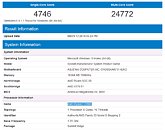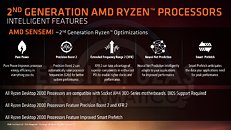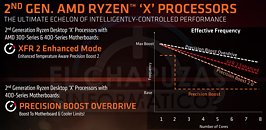Wednesday, March 14th 2018

AMD Ryzen 7 2700X Rears Its Head On Geekbench
As we grow ever closer to the launch of AMD's 2000-series, details and scores are expected to be revealed in increasingly faster fashion. Today, some Geekbench benchmarks (reportedly) of an AMD 2700X CPU have appeared, shedding some light on the expected performance - and performance improvement - of the new AMD top-of-the-line CPU.
The Ryzen 7 2700X CPU that has been tested achieved scores of 4746 single core and 24772 multi-core, which show some interesting improvements over the original flagship Ryzen 7 1800X. The official Geekbench baseline scores for AMD's 1800X are 4249 and 21978, respectively, for single and multicore benchmarks. This means that the new 2700X, which is expected to carry an increased 100 MHz base (3.7 GHz vs 3.6 GHz) and 350 MHz higher boost (4.35 GHz vs 4.0 GHz) over the 1800X, is pulling some additional performance from some micro-architecture refinements, and not just from the added clockspeed. The mobo used, an ASUS ROG Crosshair VI Hero motherboard, is a X370-series chipset motherboard, so while it supports the new AMD CPUs, it might not fully support all their SenseMI Gen 2 improvements. From what can be gleaned, the Ryzen 7 2700X ran at its default base frequency of 3.7GHz, and the accompanying 16GB memory ran at 2.4GHz.
Source:
Hexus.net
The Ryzen 7 2700X CPU that has been tested achieved scores of 4746 single core and 24772 multi-core, which show some interesting improvements over the original flagship Ryzen 7 1800X. The official Geekbench baseline scores for AMD's 1800X are 4249 and 21978, respectively, for single and multicore benchmarks. This means that the new 2700X, which is expected to carry an increased 100 MHz base (3.7 GHz vs 3.6 GHz) and 350 MHz higher boost (4.35 GHz vs 4.0 GHz) over the 1800X, is pulling some additional performance from some micro-architecture refinements, and not just from the added clockspeed. The mobo used, an ASUS ROG Crosshair VI Hero motherboard, is a X370-series chipset motherboard, so while it supports the new AMD CPUs, it might not fully support all their SenseMI Gen 2 improvements. From what can be gleaned, the Ryzen 7 2700X ran at its default base frequency of 3.7GHz, and the accompanying 16GB memory ran at 2.4GHz.



70 Comments on AMD Ryzen 7 2700X Rears Its Head On Geekbench
The only perfect picture would be a graph with FPS over time, but that's rarely, if ever, done on a CPU test.
Also didn't see anyone mentioning max FPS, and I don't think anyone measures that anymore.
And this is not twitch.
A Mate with 7600K is not enjoying his computer life, close down everything then start a game.
7700K owners just make sure they're not doing anything heavy in the background.
me: whatever :D
Ryzen is once again, fine for gaming, yes it's not as fast as intel, but it's not going to be really noticeable, and will not prevent you from enjoying a game, unless 144Hz is one of your absolute requirement.
At this point it really looks like lynx was bored and decided to start a fight by stating the obvious. (And talking about a deal that most people shopping for a cpu won't get, the 8700k is usualy at least 100€ higher than a 1700x).
Zen+ is just a refresh with a small clock bump, I don't think that people really expected it to be a 4.7Ghz stock messia.
"Ryzen 2" is the product of the idiotic media (no amd slide/anything said ryzen 2)
Edit:
I found this explanation and it looks legit to me:
«It depends on the type of game.
If a higher res = more objects on screen, then it affects CPU usage. This is more the case with top-down view games.
Other games like FPS and such, don't have this. A higher res will strain the GPU more, resulting in less 'questions' asked by the GPU to the CPU and result in less CPU usage.»
When testing at 720p, an unrealistic environment is created to exaggerate differences which are not found at higher resolutions and settings in game. Also, what many review sites do is to lower settings at that res to make sure the GPU doesn't have much to say about things. This testing would be great if it scaled as the resolution or settings go up, however, it does not. So in the end, users see a result of Hey CPU A is 10% faster than CPU B at 720p... But when we run 1080p and use high settings and use AA, the result isn't remotely the same. And when you are at 1440+, the CPU matters very little. In the end, its not like the 10% result holds true anywhere else and creating a specific exaggerated environment just to squeeze out a data set isn't the best way to go about it. Nobody runs at 1080+ at 720p with low settings.
Now, if you offered me a free system, one with an 8700k or a 1800x, I'd take the 8700k. I'm not a fool but when it comes to my money and (charity) I went AMD on Ryzen almost entirely to give them a chance. I knew they would be beaten by Intel but when I moved up from a 6 core 3930k (that cost £450 in the day) to an 8 core 1700X that cost <£400, I saw great improvements. Given how much an 8 core CPU from Intel was back when 1700X came out, I did well.
And we still have the existential argument, WWID (What Would Intel Do) if AMD hadn't released Ryzen? You think you'd have the 8700k for that price? No chance. For once in this crazy monopolistic world, IMO, Ryzen gave both AMD and Intel customers a better deal.
What is the point of knowing CPU A and CPU B difference is 20% at 720p with low settings, but a couple % at 1080p with 'normal' settings?? What use is that 720p dataset when its settings are fabricated to show an exaggerated difference?
Anyway, this isn't about 2700X... so I digress. You are welcome to reach out through PM though. ;)
Also - you'd be amazed how many people think Ryzen is still Sandy-E level of performance.
Look at the pathetic IPC increase from sandy bridge to skylake. Barely any performance increase 90% of the time. Without AMD, intel slumbers and does jack.
Alternatively, even if ryzen was only about on par with sandy (it isnt, its on par with haswell) there has been so little activity by intel that this new generation could surge ahead of intel given another year or two. That is exciting. Oh, and double the cores for a lower price helps. And now I can build a PC without giving intel my money.